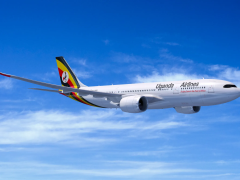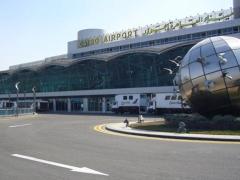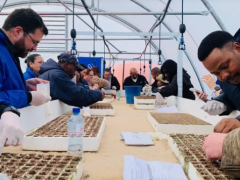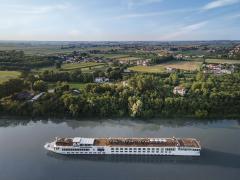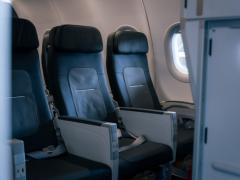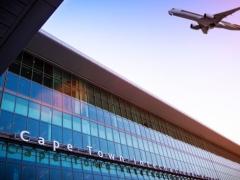The Mother City ‘back in business’
CAPE Town is increasing
its status as a leading
business destination
on the continent. Indeed,
the city was voted numberone
destination for business
events in Africa on the
ICCA rankings, and in
PricewaterhouseCoopers’
South African Hospitality
Outlook for 2015 it was
predicted that the bulk of
growth in the overall hotel
market in South Africa would
be generated in Cape Town
over the next five years.
Rick Taylor, ceo of
The Business Tourism
Company, says Cape Town
is very much becoming a
destination for business
people. He argues that this
is the result of at least
15 years of hard work
and planning. “Positioning
Cape Town as a business
destination has been part
and parcel of a long-term
view of Cape Town as an
attractive place for both
business and leisure. It
didn’t happen overnight.”
Cape Town has, over
the years, evolved into a
more corporate-focused
destination, agrees Kamil
Abdul-Karrim, director
Pam Golding Tourism &
Hospitality Consulting, who
says the corporate segment
is the largest segment
at the mid-market (threestar)
level and increasingly
more influential at both
the upscale (four-star) and
luxury (five-star) levels.
“Interestingly, business
tourism demonstrates high
demand at the luxury level,
indicating that the level of
business events attracted to
the city may be of a higher
level than elsewhere in SA.”
According to Kamil,
demand from the corporate
market is far more balanced
in terms of seasonality
than the leisure market
and, as such, growth
within this sector has the
added benefit of mitigating
the seasonality effect.
“The Cape Town hotel
market is currently more
dependent on the corporate
market than ever before.
Increases in supply of
commercial office space
mean a growth in hotel
demand, as there are more
companies present with
more employees and more
accommodation demand.”
Increased investment
Cape Town’s popularity
as both a leisure and
business destination has
brought new investment
and substantial
improvements to the city
for both travellers and
locals, says Mariette
du Toit-Helmbold, owner
of tourism marketing
agency, Destinate. “From
the airport to the road
infrastructure, improved
public transport, and
recreational areas like
the Sea Point Promenade
and Green Point Urban
Park, Cape Town is a city
evolving continuously.”
The city has indeed
seen a significant number
of new investments.
Cape Town International
Convention Centre is
expanding its space,
which is currently under
development. The V&A
Waterfront precinct has
also announced new
developments in its
Silo district, which will
comprise 35 000 sqm of
mixed-use, sustainable
development, including
new corporate offices, a
residential development,
a gymnasium and a midrange
internationally
branded hotel.
The Zeits Museum of
Contemporary Art Africa
(Zeits MOCAA) will also be
located in the heart of the
district.
In addition, a new hightech
conference centre
will open in Century
City in February 2016.
With the capacity to
accommodate 1 900
guests across 20 different
venues, the Century City
Conference Centre and
Hotel will provide the
ideal location for a wide
variety of events, from
corporate conferences
and product launches, to
expos, cocktail parties
and weddings. The centre
forms part of a R1bn
mixed-use development
within the Bridgeway
precinct.
Western Cape minister
of economic opportunities,
Alan Winde, adds that
the hospitality sector
has also seen a boost
in investment with Tsogo
Sun constructing a
500-bedroom, R640m
complex on the corner of
Buitengracht and Strand
streets. The new hotel
development will include a
200-bedroom SunSquare
hotel and a 300-bedroom
StayEasy hotel, and will
offer banqueting and
conference facilities.
“Tsogo Sun’s continued
investment in the Western
Cape speaks of the
confidence they have in
our province as a business
destination.”
Attracting events
Investment in the city’s
offering has allowed the
Cape Town Convention
Bureau to increase the
target number of event bids
for the city, reveals Rob
Kucera, gm of The Westin
in Cape Town. He says
the Bureau’s focus on lowseason
business to help
extend the peak season
will further help Cape Town
drive MICE revenue. “The
expansion of the CTICC and
the opening of Century City
will also assist in increasing
footfall into the city.”
Kamil agrees and says
that the effort put into
positioning Cape Town as a
business events destination
has paid accelerated
dividends. “The forward
event booking at CTICC
up to 2018 is ticking over.
Business tourism, driven
hugely by the CTICC, plays
a major role in reducing
the low season, which in
the past stretched from
May to mid-September
and currently spans from
June to July. What’s more,
where the occupancy in
the low season used to
drop as low as 40%, it
has now improved to over
50%, with hotels in the
CTICC vicinity recording
occupancies of over 60%.
The stats show Cape Town
is achieving its fair share
of the conferencing and
events market in relation to
Johannesburg and Durban,”
he comments.
The Western Cape’s
academic offering is another
drawcard when it comes
to driving business events.
Corne Koch, head of the
Cape Town and Western
Cape Convention Bureau,
says the Western Cape is
an intellectual magnet, with
four world-class universities
and other research
institutions in fields as
diverse as astronomy,
science, medicine and
social politics, which offers
a fertile ground for
intellectual dialogue. “When
exchanging dialogue and
ideas, in most cases a
meeting venue is required
that, in turn, benefits the
business events sector,” she
says.
Alan maintains that
the meetings industry is
an important economic
contributor to South Africa’s
economy, with business
tourists generating more
jobs on average than leisure
tourists. “It has been
encouraging that the share
of business tourists in the
city’s overall visitor numbers
has increased from 7,3% to
12,1%.”
Despite Cape Town’s
success in the MICE sector,
Nicholas Barenblatt, group
marketing manager for Protea
Hotels, warns that it is
unlikely the city will become
a business hub of the same
calibre as Johannesburg and
Sandton, as the majority of
South African corporates
are headquartered
in Johannesburg and
government is based in
Pretoria.
Rick agrees that
Johannesburg will always be
the business hub of Africa.
“It’s where things happen
business-wise.” However, he
believes there are niches
where Cape Town can
position itself as a leading
local destination, such as,
for example, the IT sector.
“Cape Town could become
the Silicon Valley of South
Africa. The possibilities are
endless.”
Business meets pleasure
The main attraction for
Cape Town as a MICE
destination is that it
is seamlessly able
to tack lifestyle and
leisure activities on to
a business stay, with
the CBD’s heritage and
culture, the Peninsula’s
stunning coastlines and
the Cape Winelands right
on its doorstep, says
Mariette.
Nicholas agrees and
says event organisers
can be a lot more
confident about getting
a good turnout at their
events because many
delegates look at these
events as opportunities
to combine a business
trip with leisure time.
He says there are some
interesting trends in this
regard. “For instance, if
one considers the fact
that the Mining Indaba
is so well attended
every year, even though
Cape Town is quite
far from the mining
centres in South Africa,
this reflects the fact
that people from many
parts of the world
simply want to visit
Cape Town because of
its attractiveness as a
tourist city
More nice, more price
THE popularity of the city
and the region as a whole
has boosted competition
among accommodation
establishments and
attractions, pushing
property owners to
increase the quality of
their service offering.
However, with demand
rising as more travellers
enter the city, prices have
also steadily increased.
Michael Nel, gm of
The Twelve Apostles
Hotel and Spa, says
there has indeed been
an increase in rates
across accommodation
establishments in Cape
Town but he argues that
it was not based on
increased demand alone.
“In general, hotel rates
have increased based
on the increasing costs
involved in running hotels.
There is more competition
around and therefore
hotels have to remain
competitively priced while
still covering their costs
and allowing for profit
margins that make the
business viable.”
The city is definitely
not pricing itself out of
the market according
to Mariette du ToitHelmbold.
She says rates
for hotels and attractions
in Cape Town depend
on the establishments’
running expenses and
competitor pricing.
“Major attractions are not
overpriced when compared
with other attractions
around the world, and
offer fantastic off-peak
season and family rates.”
Alan Winde argues that,
although there has been
a slight increase in room
rates, major investments
in the hospitality sector
will all ensure the
establishments’ rates
remain competitive.
What’s more, Kamil
Abdul-Karrim points out
that, while demand for
hotel accommodation in
Cape Town has increased
consistently since the
2009 recession, with the
period 2011 to 2014
reflecting an average
approximate 5% per
annum growth, demand
will likely now be affected
by the implementation
of the new visa and
unabridged birth certificate
regulations. “Accentuated
pricing competition could
well result in pricing
decreases.”
Are standards improving?
THE quality of Cape
Town’s service has
steadily improved and
the hospitality sector
has earned international
acclaim, says Alan Winde.
“These accolades garner
international exposure for
the establishments and for
the destination as a whole.
They also point to growing
service excellence in our
tourism sector.”
The increase in tourism
has had a positive impact
on standards, agrees
Michael Nel. “Cape Town
Tourism is very proactive
and works closely with
Wesgro and the CTICC. Our
streets are being cleaned
more regularly, there is
more visible policing and
security cameras have
been erected in the city
centre.”
However, Rob Kucera
disagrees, saying that as
hard development has been
increasing at a phenomenal
rate, the concern is that
service levels are not
adequate and that available
resources are not being
increased at the same
rate business is growing.
“Businesses are under
pressure with the increased
numbers – many hotels,
restaurants and sights
can’t increase their head
count without enduring
rising costs or investing a
huge amount of money on
training,” he maintains.


